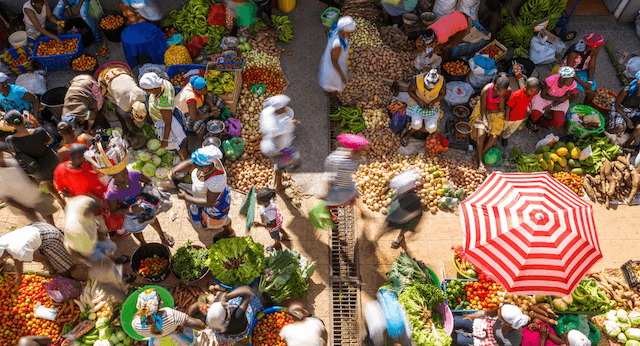These Chefs Are on a Mission to Decolonize West African Food

When asked “Where is imperialism in Africa?” former president of Burkina Faso Thomas Sankara said the answer was simple. “Look at your plates, at the imported grains of wheat, rice, and millet—that is imperialism.” Sankara’s advocacy for African self-dependence in everything from politics to food was considered revolutionary in the 1980s, but today, his message is championed across Western Africa as chefs begin to liberate their craft from the pall of history.
“The present view of West African cuisine is complicated,” says Ozoz Sokoh, a culinary anthropologist from Lagos, Nigeria. “To decolonize it means going back to its origins, to see its connections with other cuisines.” That was the ethos behind Feast Afrique, her online collection of cookbooks and literature relating to African and African-centric cuisine released in 2021, which provides resources to help West Africans understand their culinary identity and heritage.
Starting with books like The Jemima Code by Toni Tipton-Martin, and Doris Witt’s Black Hunger, Sokoh followed edible traces from African American cookbooks back to their fundamental continental African recipes. “European cuisine is always seen as having deep roots because its reference material stretches back hundreds of years,” she says. “These African cookbooks prove the same depth of history.”

Foundational recipes are becoming increasingly important in both restaurant and home kitchens across West Africa, as the tides of decolonization inspire a revival of historical recognition within the food industry. Chefs like Fatmata Binta, who operates Ghana’s Fulani Kitchen, Senegalese celebrity chef Pierre Thiam, and the Gambia’s Ousman Manneh are setting the pace for this culinary reckoning. Ousman, who presides over Kololi’s Luna Lounge, one of the Gambia’s top restaurants, says high tourist traffic makes decolonization especially important, as foreigners’ tastes for familiar food threaten to supersede local offerings. “If we are to move forward as a people—as a continent—our food has to be localized,” Ousman tells me over a steaming pot of his homemade benachin. “Ninety percent of our food is coming from outside—Europe, North America, even New Zealand. Chefs and restaurants must take the lead to empower the African farmer.”
Global agricultural structures have long privileged crop uniformity over a diversity of regionalized products, a practice that originated in catering to colonial powers’ needs. Over centuries, native African grains like sorghum and fonio have been eclipsed by foreign wheat, rice, and oilseeds, imported crops that often beget financial and social inequities in local economies where they often cannot be processed, and therefore cannot be used for local consumption. Where they can be used, they pose the risk of creating an erasure effect on knowledge of native ingredients.
Ousman points to yassa—a popular chicken dish from the Senegambian region made with onions, citrus, and mustard—as a good example of how a traditional dish can change over time. Mustard is a modern additive to the dish, included after the plant was imported to Africa from North America during the trans-Atlantic slave trade. Changes like these, Ousman says, will affect the historical authenticity of any country’s cuisine. “The food becomes caged by needing ingredients from outside West Africa to be considered ‘authentic.’ If any meal deviates from its original ingredients, you are unconsciously creating a whole new meal.”
Ousman also cites the stock cube, which has usurped locust bean (known regionally as sounbareh or dawadawa) and fermented sesame seeds (ogeri) as West Africa’s principal flavor enhancer. But there are countless other such endemic substitutions that can be made for invasive ingredients, to reassert local products: bambara beans for peanuts; tatashe for tomatoes; buchu, baobab, sorel, and ngai ngai leaves, for imported teas and juices.
Upcoming generations of chefs will need guidance and leadership from existing professionals on how to use those domestic ingredients. This was chef Saikou Bojang’s epiphany when he saw West African culinary schools passing over what were viewed as “lessor” African dishes to teach foreign cuisines. After 20 years of cooking in over a dozen countries, he returned to the Gambia in 2017 to rectify that imbalance, and has since led the country to gold in three categories at the prestigious African Food Festival, including Best Chef and Best Dessert. “So many people are leaving, but I am back to find my greener pasture,” he told me on a hot afternoon near Kololi beach. “I want to make home home again.”
For Bojang, helping to proliferate West Africa’s traditional cuisine means preventing the culinary brain drain that has afflicted the region in the past. Today, he travels West Africa, teaching upcoming generations of chefs to honor their culinary heritage, and to cook their ancestral foods without reservation. All the same, his culinary approach to food decolonization is an intermarriage of foods. “I believe in integration,” he says. “If I say no to foreign food, then I am saying no to foreigners.” By tempting both foreign and local palates, he’s able to highlight the West African contribution to a particular dish. His creations are an innovative melding of traditional Gambian cuisine with western tastes, with dishes such as wonjo cheesecake, chicken yassa cordon bleu, churragerrte pudding, and beetroot brownie.
In her 2020 film Coast to Coast, Sokoh underscores food as one of the “most resistant and resilient markers of cultural identity, sustained by memory and lived experiences.” What these chefs and innovators prove is that, for them, their heritage is not defined by foreign countries, but by the deep roots of their homeland.
Source: James Patterson
Oral Ofori is Founder and Publisher at www.TheAfricanDream.net, a digital storyteller and producer, and also an information and research consultant.





